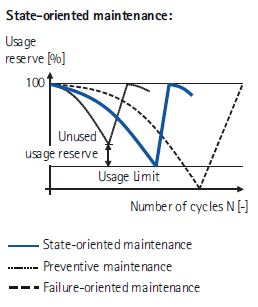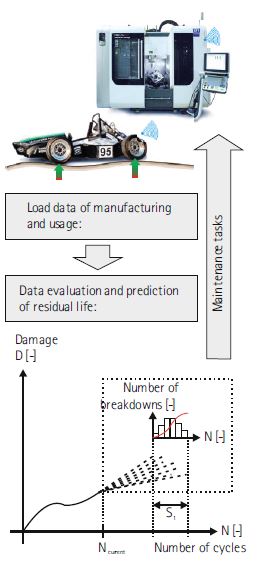Condition-based maintenance based on real life load data from a component's life cycle
Currently the failure behaviour of components for the determination of preventive maintenance timing is described based on reliability models. However, often current data concerning a possible breakdown in the future can’t be recorded continuously and is mostly ambiguously interpretable.
Furthermore a big part of current monitoring targets only abrasion as a wear-out type but do not take into consideration the material fatigue. In this context the state-oriented maintenance offers a high potential particularly with regard to the prevention of spontaneous breakdown of component with risk of fatigue. Fatigue of components is not externally apparent judging by the operational performance and monitoring of the on going operation is currently very difficult.
In the subproject N3, a methodology for components status-driven maintenance of gentelligent components (Figure 1) will be developed, where empirical data is used to provide the fatigue state, thus avoiding expensive spontaneous breakdowns of safety-relevant components. Load data is obtained from the component’s manufacturing as well as from its usage and allows for a prediction of residual life of the components. In this way, state-oriented maintenance timing can be planned (Figure 2).






To realize the described intent, various cooperation exist within the special research field. For the consideration of data concerning the component’s manufacturing beside the usage load, the subprojects K2 and N1 provide information about production parameters and process forces. To detect these occurring forces, micro sensors developed in subproject S1 are utilized.
Also enhancements of the methodology for determination of system states are planned in subproject N3 as well as an intelligent selective algorithm for identification of optimal maintenance measures. This allows the usage potential of components to get increasingly exhausted and the maintenance costs to get minimized.
Subproject leader






